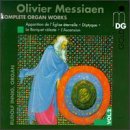| All Artists: Olivier Messiaen, Rudolf Innig Title: Olivier Messiaen: Complete Organ Works, Vol. 2 Members Wishing: 1 Total Copies: 0 Label: MD&G Records Release Date: 5/21/1996 Genre: Classical Styles: Chamber Music, Historical Periods, Classical (c.1770-1830), Modern, 20th, & 21st Century Number of Discs: 1 SwapaCD Credits: 1 UPC: 760623034621 |
Search - Olivier Messiaen, Rudolf Innig :: Olivier Messiaen: Complete Organ Works, Vol. 2
 | Olivier Messiaen, Rudolf Innig Olivier Messiaen: Complete Organ Works, Vol. 2 Genre: Classical
|
Larger Image |
CD Details |
CD ReviewsUseful as an introduction Mark Swinton | 09/28/2000 (4 out of 5 stars) "This disc is notable among many exclusively-Messiaen programmes in that it brings together three of his most celebrated works for solo organ: "Apparition de l'eglise eternelle," "Le banquet celeste" and "L'ascension," all of which I have performed myself as a performer's first study of the composer.The instrument selected for the recording is not perhaps the best that could have been used: it is a German organ and speaks with a distinctively German 'accent' (thus lacking the necessary tone qualities sought by Messiaen on his instrument at La Trinite in Paris). Rudolf Innig is obviously a fine player, though, and I feel that he compensates marvellously for this drawback, creating a technically flawless and arresting rendition that perfectly evokes the energy and drive behind the music."Apparition de l'eglise eternelle" is a slow and awesome piece, depicting the Divine Presence appearing in the heavens, growing larger, nearer and brighter with what Messiaen describes (the booklet notes are his own) as hammer blows of grace, until the organ is at full volume and the effect is dazzling. As gradually as it appears, this aural image recedes until the quietness of the opening is restored- undoubtedly one of Messiaen's finest musical achievements."Le banquet celeste" is even more approachable: just as slow but even more ecstatic, depicting in music the parallel imagery of the Last Supper and the Crucifixion, in the form of a dense chorale in the manuals with a high-pitched pedal melody sounding like "drops of water" (or is it the Precious Blood of Christ?). The harmonies are radiant and the overall effect is awesome, albeit in quite a different way than the apparition of the Eternal Church..."Diptyque" is the longest single-movement in the programme, and is perhaps the hardest to grasp out of the four works on the disc. It is a typical showcase for Messiaen's unique modality; the dynamic contrasts in the piece are not as wide as they are in the others. Ultimately, and like all of Messiaen's music, it is something that you will have to take or leave, depending upon how you appreciate it.The closing work, "L'ascension," is another famous example of Messiaen's finest writing for organ. Comprised of four symphonic meditations on the last moments of Christ: his final prayers for himself and for mankind; the joy of his rising up to Heaven to take his place at God's right hand. Messiaen explores the colours of the organ most fully in this work, including dense chorale figures in the first movement, plenty of soloistic material in the second, a loud and flambuoyant third movement (which he re-wrote when transcribing the work for orchestra) and an exquisitely soft ending.This disc would make a good introduction for anyone who has never heard the music of Olivier Messiaen before. Innig makes a strong case for it in performance, and the recording quality is superb: though at times a little too noisy for my liking, the organ and generous acoustics are masterfully captured."
|

 Track Listings (7) - Disc #1
Track Listings (7) - Disc #1